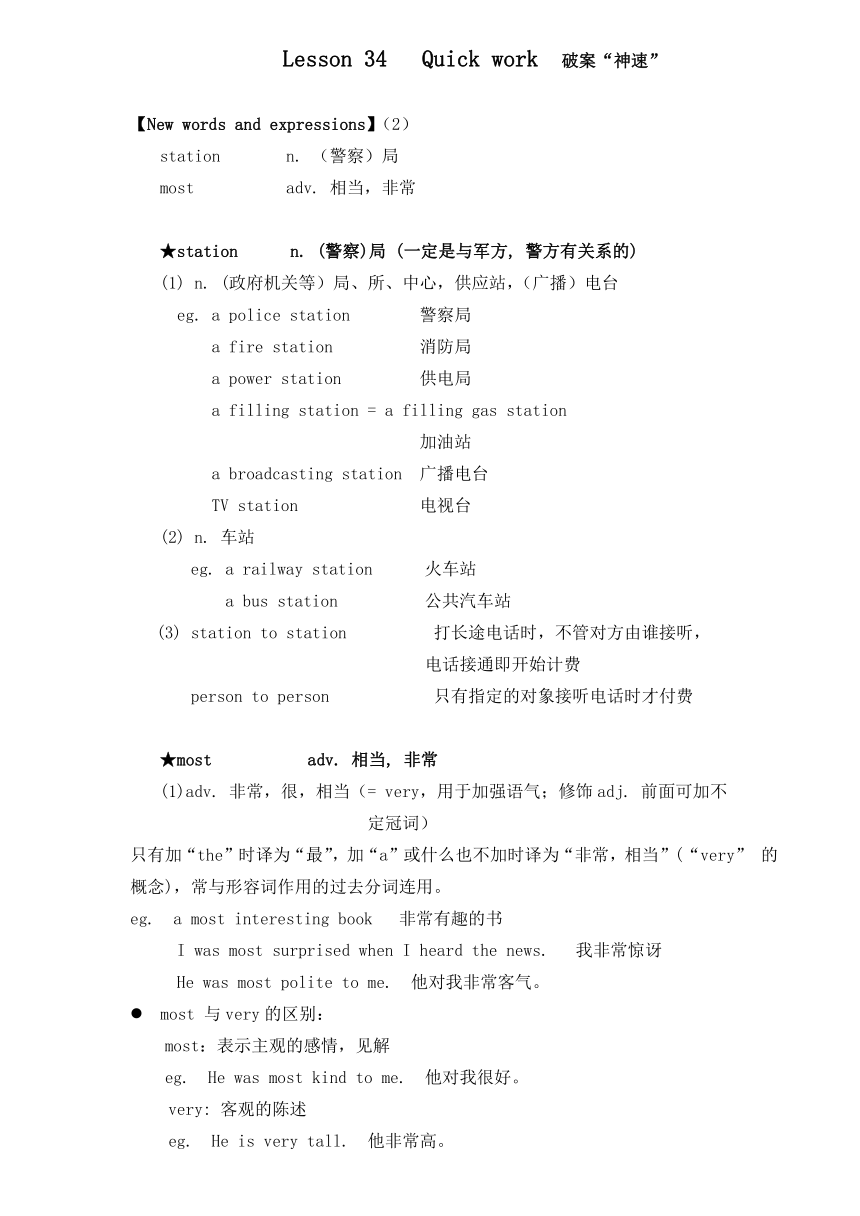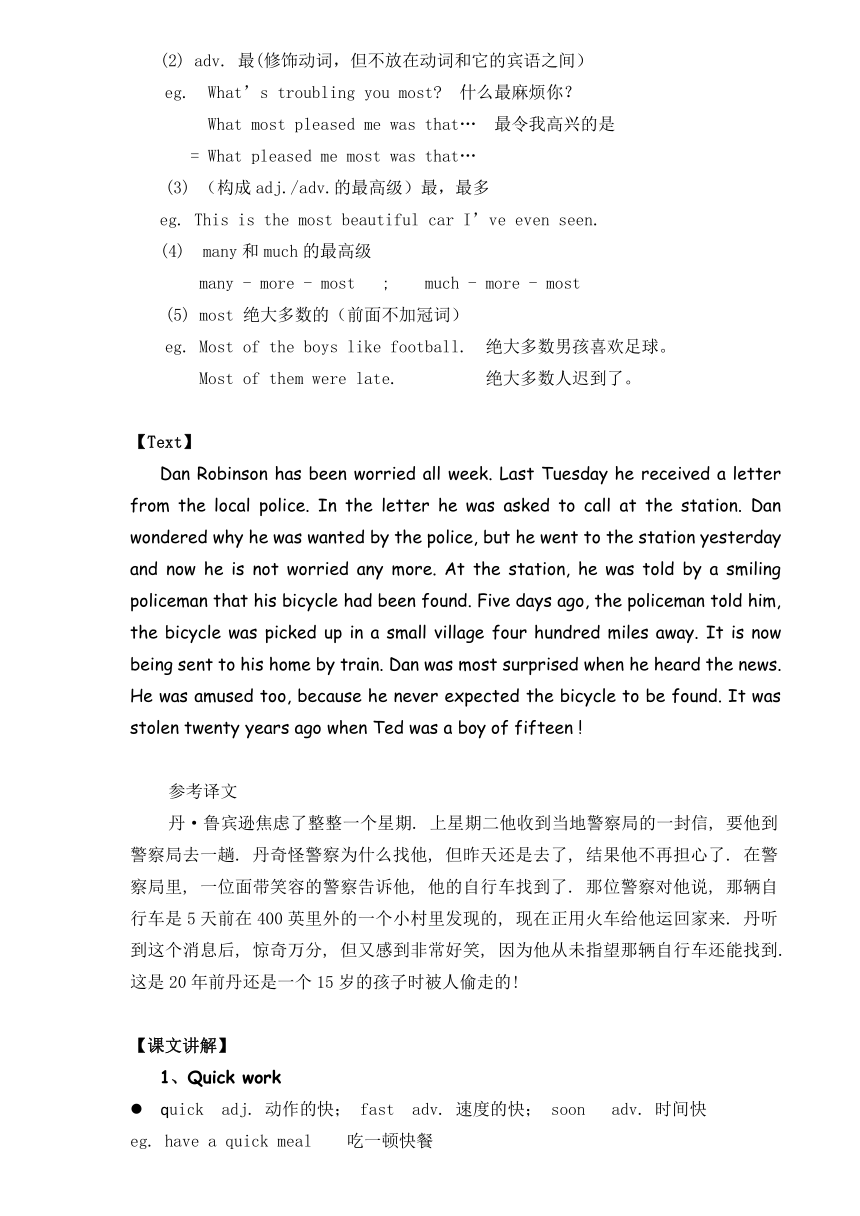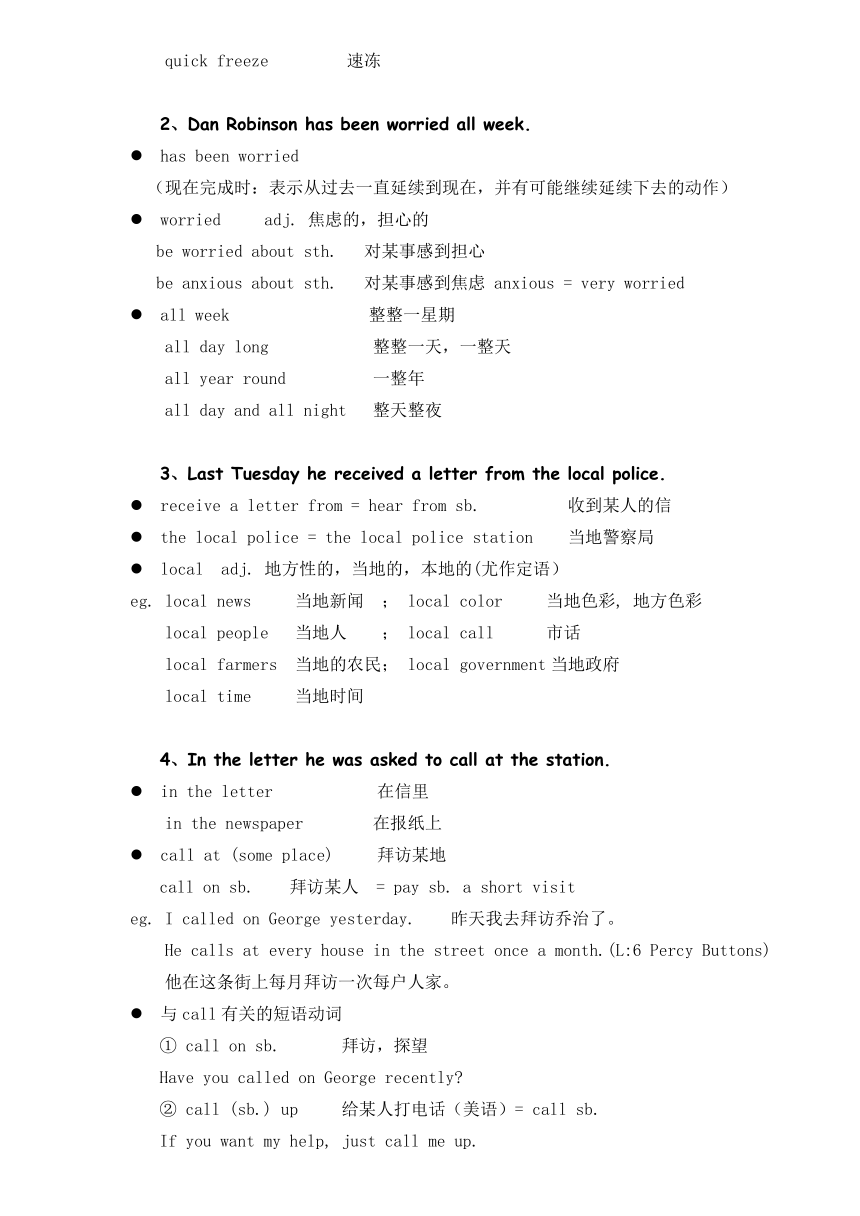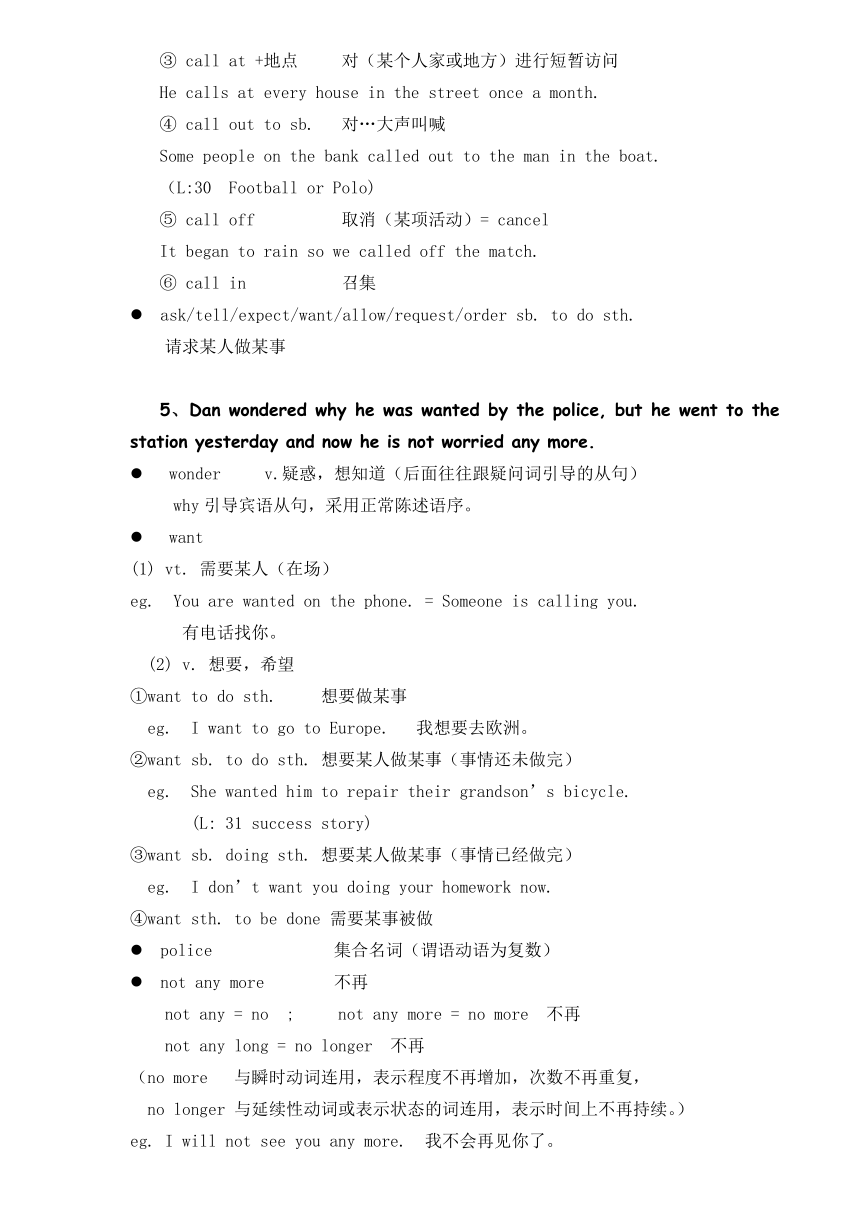新概念英语第二册 Lesson 34 Quick work 破案“神速” 笔记
文档属性
| 名称 | 新概念英语第二册 Lesson 34 Quick work 破案“神速” 笔记 |  | |
| 格式 | docx | ||
| 文件大小 | 27.7KB | ||
| 资源类型 | 教案 | ||
| 版本资源 | 新概念英语 | ||
| 科目 | 英语 | ||
| 更新时间 | 2023-09-26 06:30:05 | ||
图片预览




文档简介
Lesson 34 Quick work 破案“神速”
【New words and expressions】(2)
station n. (警察)局
most adv. 相当,非常
★station n. (警察)局 (一定是与军方, 警方有关系的)
(1) n. (政府机关等)局、所、中心,供应站,(广播)电台
eg. a police station 警察局
a fire station 消防局
a power station 供电局
a filling station = a filling gas station
加油站
a broadcasting station 广播电台
TV station 电视台
n. 车站
eg. a railway station 火车站
a bus station 公共汽车站
(3) station to station 打长途电话时,不管对方由谁接听,
电话接通即开始计费
person to person 只有指定的对象接听电话时才付费
★most adv. 相当, 非常
(1)adv. 非常,很,相当(= very,用于加强语气;修饰adj. 前面可加不
定冠词)
只有加“the”时译为“最”,加“a”或什么也不加时译为“非常,相当”(“very” 的概念),常与形容词作用的过去分词连用。
eg. a most interesting book 非常有趣的书
I was most surprised when I heard the news. 我非常惊讶
He was most polite to me. 他对我非常客气。
most 与very的区别:
most:表示主观的感情,见解
eg. He was most kind to me. 他对我很好。
very: 客观的陈述
eg. He is very tall. 他非常高。
adv. 最(修饰动词,但不放在动词和它的宾语之间)
eg. What’s troubling you most 什么最麻烦你?
What most pleased me was that… 最令我高兴的是
= What pleased me most was that…
(3) (构成adj./adv.的最高级)最,最多
eg. This is the most beautiful car I’ve even seen.
many和much的最高级
many - more - most ; much - more - most
(5) most 绝大多数的(前面不加冠词)
eg. Most of the boys like football. 绝大多数男孩喜欢足球。
Most of them were late. 绝大多数人迟到了。
【Text】
Dan Robinson has been worried all week. Last Tuesday he received a letter from the local police. In the letter he was asked to call at the station. Dan wondered why he was wanted by the police, but he went to the station yesterday and now he is not worried any more. At the station, he was told by a smiling policeman that his bicycle had been found. Five days ago, the policeman told him, the bicycle was picked up in a small village four hundred miles away. It is now being sent to his home by train. Dan was most surprised when he heard the news. He was amused too, because he never expected the bicycle to be found. It was stolen twenty years ago when Ted was a boy of fifteen !
参考译文
丹·鲁宾逊焦虑了整整一个星期. 上星期二他收到当地警察局的一封信, 要他到警察局去一趟. 丹奇怪警察为什么找他, 但昨天还是去了, 结果他不再担心了. 在警察局里, 一位面带笑容的警察告诉他, 他的自行车找到了. 那位警察对他说, 那辆自行车是5天前在400英里外的一个小村里发现的, 现在正用火车给他运回家来. 丹听到这个消息后, 惊奇万分, 但又感到非常好笑, 因为他从未指望那辆自行车还能找到. 这是20年前丹还是一个15岁的孩子时被人偷走的!
【课文讲解】
Quick work
quick adj. 动作的快; fast adv. 速度的快; soon adv. 时间快
eg. have a quick meal 吃一顿快餐
quick freeze 速冻
2、Dan Robinson has been worried all week.
has been worried
(现在完成时:表示从过去一直延续到现在,并有可能继续延续下去的动作)
worried adj. 焦虑的,担心的
be worried about sth. 对某事感到担心
be anxious about sth. 对某事感到焦虑 anxious = very worried
all week 整整一星期
all day long 整整一天,一整天
all year round 一整年
all day and all night 整天整夜
3、Last Tuesday he received a letter from the local police.
receive a letter from = hear from sb. 收到某人的信
the local police = the local police station 当地警察局
local adj. 地方性的,当地的,本地的(尤作定语)
eg. local news 当地新闻 ; local color 当地色彩, 地方色彩
local people 当地人 ; local call 市话
local farmers 当地的农民; local government当地政府
local time 当地时间
4、In the letter he was asked to call at the station.
in the letter 在信里
in the newspaper 在报纸上
call at (some place) 拜访某地
call on sb. 拜访某人 = pay sb. a short visit
eg. I called on George yesterday. 昨天我去拜访乔治了。
He calls at every house in the street once a month.(L:6 Percy Buttons)
他在这条街上每月拜访一次每户人家。
与call有关的短语动词
① call on sb. 拜访,探望
Have you called on George recently
② call (sb.) up 给某人打电话(美语)= call sb.
If you want my help, just call me up.
③ call at +地点 对(某个人家或地方)进行短暂访问
He calls at every house in the street once a month.
④ call out to sb. 对…大声叫喊
Some people on the bank called out to the man in the boat.
(L:30 Football or Polo)
⑤ call off 取消(某项活动)= cancel
It began to rain so we called off the match.
⑥ call in 召集
ask/tell/expect/want/allow/request/order sb. to do sth.
请求某人做某事
5、Dan wondered why he was wanted by the police, but he went to the station yesterday and now he is not worried any more.
wonder v.疑惑,想知道(后面往往跟疑问词引导的从句)
why引导宾语从句,采用正常陈述语序。
want
vt. 需要某人(在场)
eg. You are wanted on the phone. = Someone is calling you.
有电话找你。
(2) v. 想要,希望
①want to do sth. 想要做某事
eg. I want to go to Europe. 我想要去欧洲。
②want sb. to do sth. 想要某人做某事(事情还未做完)
eg. She wanted him to repair their grandson’s bicycle.
(L: 31 success story)
③want sb. doing sth. 想要某人做某事(事情已经做完)
eg. I don’t want you doing your homework now.
④want sth. to be done 需要某事被做
police 集合名词(谓语动语为复数)
not any more 不再
not any = no ; not any more = no more 不再
not any long = no longer 不再
(no more 与瞬时动词连用,表示程度不再增加,次数不再重复,
no longer 与延续性动词或表示状态的词连用,表示时间上不再持续。)
eg. I will not see you any more. 我不会再见你了。
= I will see you no more.
6、At the station, he was told by a smiling policeman that his bicycle had been found.
smiling adj. 微笑的,笑容可拘的
smile v./n. 微笑
unsmiling adj. 不苟言笑的
7、Five days ago, the policeman told him, the bicycle was picked up in a small village four hundred miles away.
the policeman told him 作插入语
pick up
拾起,捡起
eg. He picked up the wallet and put it into his own pocket.
他捡起钱包放进自己的口袋。
(2)接收(信号、节目)
eg. pick up radio programmes 收听广播节目
通过实践学会(study/learn主动学)
eg. My neighbor is an American. We get along well. So I pick up English
easily.我邻居是英国人,我们相处得很好,所以我很容易就学会了英语。
接…,让…上车
eg. I’ll pick you up at the corner of the street.我到街道拐角处接你。
four hundred miles away作定语修饰village
eg. The school is five miles away. 学校在五里外
the school five miles away 五里外的学校
I live in a house which is five miles away.
= I live in a house five miles away.
8、It is now being sent to his home by train.
这句话是现在进行时态的被动语态时,其结构为“am/is/are +being +过去分词”
eg. The clavichord is being repaired by a friend of my father’s.
(L:10 Not for jazz)
by train/by bus/by road/by sea/by air
home 前一旦加修饰词(如文中的his), 则其为名词
9、Dan was most surprised when he heard the news.
most surprised中的most有very的意思,常与起形容词作用的过去分词连用。
10、He was amused too, because he never expected the bicycle to
be found.
amused adj. 感到好笑的,感到愉快的(通常人作主语)
amusing adj. 令人好笑的(通常物作主语)
amusement n. 娱乐
amuse v. 逗乐,使…快乐
eg. amuse oneself 自娱自乐
eg. interesting 令人感兴趣 intersted感兴趣
surprising 令人吃惊 surprised感到吃惊
exciting 令人激动 excited 感到激动
expect v. 预料,预计,期待,盼望
expect sth. to be done 期待某事被做
expect to do sth. 期待做某事
expect sb. to do sth. 期待某人做某事,预料某人做某事
eg. We expected him to arrive yesterday. 我们原以为他昨天能到。
11、It was stolen twenty years ago when Dan was a boy of fifteen!
此句是一般过去时态的被动语态。
when引导时间状语从句
of fifteen 修饰boy ,是后置定语
eg. This time, she will be a girl of seventeen.
这一次,她将扮演一个17岁的少女。
(L:17 Always young)
从课文中所出所有的被动句,并将其还原为主动语态。
In the letter he was asked to call at the station.
= In the letter, the police asked him to call at the station.
Dan wondered why he was wanted by the police.
= Dan wondered why the police wanted him.
At the station, he was told by a smiling policeman that his bicycle had been found.
= At the station, a smiling policeman told him that they had found his bicycle.
…the bicycle was picked up in a small village…
= The police picked up the bicycle in a small village.
It is now being sent to his home by train.
= They are now sending it to his home by train.
It was stolen twenty years ago…
= Someone stole it twenty years ago.
【Key Structures】
被动语态
be + 过去分词,时态通过be体现。
被动语态除常用be加过去分词外,还可用get加过去分词(用于口语中)。
eg. Hundreds of people get killed every year by traffiic on the roads.
每年都有几百人死于交通事故。
The boy got hurt on his way to school. 那个男孩在上学路上受伤了。
主 + 谓 + 复合宾语(宾语+宾语补足语)变为被动结构时,只将主动结构中
的宾语变为被动结构中的主语,宾语补足语不变。
eg. They chose Harry captain. 他们选Harry当船长。
= Harry was chosen captain.
We asked the teacher to explain the difficult sentence again.
= The teacher was asked to explain the difficult sentence again.
老师被要求把难的句子再解释一遍。
We found him lying on the floor. 我们发现他躺在地上。
= He was found lying on the floor.
以下情况中,主动句一般不能变为被动句。
谓语为不及物动词
eg. The puppy died. 小狗死了。
谓语为及物动词leave, enter, reach, resemble, become, suit, benefit, lack等。
eg. leave Beijing; enter the boss’s office;
(3) 不可拆开的动词短语。
eg. take place ; lose heart ; change colour ; belong to
consist of
【New words and expressions】(2)
station n. (警察)局
most adv. 相当,非常
★station n. (警察)局 (一定是与军方, 警方有关系的)
(1) n. (政府机关等)局、所、中心,供应站,(广播)电台
eg. a police station 警察局
a fire station 消防局
a power station 供电局
a filling station = a filling gas station
加油站
a broadcasting station 广播电台
TV station 电视台
n. 车站
eg. a railway station 火车站
a bus station 公共汽车站
(3) station to station 打长途电话时,不管对方由谁接听,
电话接通即开始计费
person to person 只有指定的对象接听电话时才付费
★most adv. 相当, 非常
(1)adv. 非常,很,相当(= very,用于加强语气;修饰adj. 前面可加不
定冠词)
只有加“the”时译为“最”,加“a”或什么也不加时译为“非常,相当”(“very” 的概念),常与形容词作用的过去分词连用。
eg. a most interesting book 非常有趣的书
I was most surprised when I heard the news. 我非常惊讶
He was most polite to me. 他对我非常客气。
most 与very的区别:
most:表示主观的感情,见解
eg. He was most kind to me. 他对我很好。
very: 客观的陈述
eg. He is very tall. 他非常高。
adv. 最(修饰动词,但不放在动词和它的宾语之间)
eg. What’s troubling you most 什么最麻烦你?
What most pleased me was that… 最令我高兴的是
= What pleased me most was that…
(3) (构成adj./adv.的最高级)最,最多
eg. This is the most beautiful car I’ve even seen.
many和much的最高级
many - more - most ; much - more - most
(5) most 绝大多数的(前面不加冠词)
eg. Most of the boys like football. 绝大多数男孩喜欢足球。
Most of them were late. 绝大多数人迟到了。
【Text】
Dan Robinson has been worried all week. Last Tuesday he received a letter from the local police. In the letter he was asked to call at the station. Dan wondered why he was wanted by the police, but he went to the station yesterday and now he is not worried any more. At the station, he was told by a smiling policeman that his bicycle had been found. Five days ago, the policeman told him, the bicycle was picked up in a small village four hundred miles away. It is now being sent to his home by train. Dan was most surprised when he heard the news. He was amused too, because he never expected the bicycle to be found. It was stolen twenty years ago when Ted was a boy of fifteen !
参考译文
丹·鲁宾逊焦虑了整整一个星期. 上星期二他收到当地警察局的一封信, 要他到警察局去一趟. 丹奇怪警察为什么找他, 但昨天还是去了, 结果他不再担心了. 在警察局里, 一位面带笑容的警察告诉他, 他的自行车找到了. 那位警察对他说, 那辆自行车是5天前在400英里外的一个小村里发现的, 现在正用火车给他运回家来. 丹听到这个消息后, 惊奇万分, 但又感到非常好笑, 因为他从未指望那辆自行车还能找到. 这是20年前丹还是一个15岁的孩子时被人偷走的!
【课文讲解】
Quick work
quick adj. 动作的快; fast adv. 速度的快; soon adv. 时间快
eg. have a quick meal 吃一顿快餐
quick freeze 速冻
2、Dan Robinson has been worried all week.
has been worried
(现在完成时:表示从过去一直延续到现在,并有可能继续延续下去的动作)
worried adj. 焦虑的,担心的
be worried about sth. 对某事感到担心
be anxious about sth. 对某事感到焦虑 anxious = very worried
all week 整整一星期
all day long 整整一天,一整天
all year round 一整年
all day and all night 整天整夜
3、Last Tuesday he received a letter from the local police.
receive a letter from = hear from sb. 收到某人的信
the local police = the local police station 当地警察局
local adj. 地方性的,当地的,本地的(尤作定语)
eg. local news 当地新闻 ; local color 当地色彩, 地方色彩
local people 当地人 ; local call 市话
local farmers 当地的农民; local government当地政府
local time 当地时间
4、In the letter he was asked to call at the station.
in the letter 在信里
in the newspaper 在报纸上
call at (some place) 拜访某地
call on sb. 拜访某人 = pay sb. a short visit
eg. I called on George yesterday. 昨天我去拜访乔治了。
He calls at every house in the street once a month.(L:6 Percy Buttons)
他在这条街上每月拜访一次每户人家。
与call有关的短语动词
① call on sb. 拜访,探望
Have you called on George recently
② call (sb.) up 给某人打电话(美语)= call sb.
If you want my help, just call me up.
③ call at +地点 对(某个人家或地方)进行短暂访问
He calls at every house in the street once a month.
④ call out to sb. 对…大声叫喊
Some people on the bank called out to the man in the boat.
(L:30 Football or Polo)
⑤ call off 取消(某项活动)= cancel
It began to rain so we called off the match.
⑥ call in 召集
ask/tell/expect/want/allow/request/order sb. to do sth.
请求某人做某事
5、Dan wondered why he was wanted by the police, but he went to the station yesterday and now he is not worried any more.
wonder v.疑惑,想知道(后面往往跟疑问词引导的从句)
why引导宾语从句,采用正常陈述语序。
want
vt. 需要某人(在场)
eg. You are wanted on the phone. = Someone is calling you.
有电话找你。
(2) v. 想要,希望
①want to do sth. 想要做某事
eg. I want to go to Europe. 我想要去欧洲。
②want sb. to do sth. 想要某人做某事(事情还未做完)
eg. She wanted him to repair their grandson’s bicycle.
(L: 31 success story)
③want sb. doing sth. 想要某人做某事(事情已经做完)
eg. I don’t want you doing your homework now.
④want sth. to be done 需要某事被做
police 集合名词(谓语动语为复数)
not any more 不再
not any = no ; not any more = no more 不再
not any long = no longer 不再
(no more 与瞬时动词连用,表示程度不再增加,次数不再重复,
no longer 与延续性动词或表示状态的词连用,表示时间上不再持续。)
eg. I will not see you any more. 我不会再见你了。
= I will see you no more.
6、At the station, he was told by a smiling policeman that his bicycle had been found.
smiling adj. 微笑的,笑容可拘的
smile v./n. 微笑
unsmiling adj. 不苟言笑的
7、Five days ago, the policeman told him, the bicycle was picked up in a small village four hundred miles away.
the policeman told him 作插入语
pick up
拾起,捡起
eg. He picked up the wallet and put it into his own pocket.
他捡起钱包放进自己的口袋。
(2)接收(信号、节目)
eg. pick up radio programmes 收听广播节目
通过实践学会(study/learn主动学)
eg. My neighbor is an American. We get along well. So I pick up English
easily.我邻居是英国人,我们相处得很好,所以我很容易就学会了英语。
接…,让…上车
eg. I’ll pick you up at the corner of the street.我到街道拐角处接你。
four hundred miles away作定语修饰village
eg. The school is five miles away. 学校在五里外
the school five miles away 五里外的学校
I live in a house which is five miles away.
= I live in a house five miles away.
8、It is now being sent to his home by train.
这句话是现在进行时态的被动语态时,其结构为“am/is/are +being +过去分词”
eg. The clavichord is being repaired by a friend of my father’s.
(L:10 Not for jazz)
by train/by bus/by road/by sea/by air
home 前一旦加修饰词(如文中的his), 则其为名词
9、Dan was most surprised when he heard the news.
most surprised中的most有very的意思,常与起形容词作用的过去分词连用。
10、He was amused too, because he never expected the bicycle to
be found.
amused adj. 感到好笑的,感到愉快的(通常人作主语)
amusing adj. 令人好笑的(通常物作主语)
amusement n. 娱乐
amuse v. 逗乐,使…快乐
eg. amuse oneself 自娱自乐
eg. interesting 令人感兴趣 intersted感兴趣
surprising 令人吃惊 surprised感到吃惊
exciting 令人激动 excited 感到激动
expect v. 预料,预计,期待,盼望
expect sth. to be done 期待某事被做
expect to do sth. 期待做某事
expect sb. to do sth. 期待某人做某事,预料某人做某事
eg. We expected him to arrive yesterday. 我们原以为他昨天能到。
11、It was stolen twenty years ago when Dan was a boy of fifteen!
此句是一般过去时态的被动语态。
when引导时间状语从句
of fifteen 修饰boy ,是后置定语
eg. This time, she will be a girl of seventeen.
这一次,她将扮演一个17岁的少女。
(L:17 Always young)
从课文中所出所有的被动句,并将其还原为主动语态。
In the letter he was asked to call at the station.
= In the letter, the police asked him to call at the station.
Dan wondered why he was wanted by the police.
= Dan wondered why the police wanted him.
At the station, he was told by a smiling policeman that his bicycle had been found.
= At the station, a smiling policeman told him that they had found his bicycle.
…the bicycle was picked up in a small village…
= The police picked up the bicycle in a small village.
It is now being sent to his home by train.
= They are now sending it to his home by train.
It was stolen twenty years ago…
= Someone stole it twenty years ago.
【Key Structures】
被动语态
be + 过去分词,时态通过be体现。
被动语态除常用be加过去分词外,还可用get加过去分词(用于口语中)。
eg. Hundreds of people get killed every year by traffiic on the roads.
每年都有几百人死于交通事故。
The boy got hurt on his way to school. 那个男孩在上学路上受伤了。
主 + 谓 + 复合宾语(宾语+宾语补足语)变为被动结构时,只将主动结构中
的宾语变为被动结构中的主语,宾语补足语不变。
eg. They chose Harry captain. 他们选Harry当船长。
= Harry was chosen captain.
We asked the teacher to explain the difficult sentence again.
= The teacher was asked to explain the difficult sentence again.
老师被要求把难的句子再解释一遍。
We found him lying on the floor. 我们发现他躺在地上。
= He was found lying on the floor.
以下情况中,主动句一般不能变为被动句。
谓语为不及物动词
eg. The puppy died. 小狗死了。
谓语为及物动词leave, enter, reach, resemble, become, suit, benefit, lack等。
eg. leave Beijing; enter the boss’s office;
(3) 不可拆开的动词短语。
eg. take place ; lose heart ; change colour ; belong to
consist of
同课章节目录
